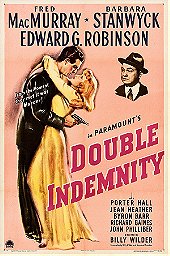Generally considered the prototypical film noir, establishing many of the genre's codes and conventions, as well as its stylistic form, "Double Indemnity" also promulgated its writer-director Billy Wilder's ascension to greatness, securing his newfound position as one of the Hollywood elite practically overnight. It is a rough diamond: hard-edged, sombre and sly, riveting and suspenseful from the outset and despite its downbeat, cynical streak, laden with mirth, but Hollywood relished this darker content with delight. Wilder tapped into the consciousness of the public, honing in on their innermost desires, anxieties and fantasies before projecting them onto the screen and crafting exceptional quality cinema.
Wilder would retain his forte for well-written dialogue, but here it dazzles and revels in its own hardboiled sharpness. Flirtation, flippancy and deceit drip from the waxy pout of the Machiavellian, surly and brash Barbara Stanwyck, whose bad wig and dangerously seductive anklet compound the film's richly detailed tapestry of shady scams, sleaze and insincerity. Stanwyck's iconic portrayal of Phyllis Dietrichson is the ultimate depiction of the phony femme fatale; Wilder assures us that she lures, corrupts and manipulates the gullible Fred MacMurray's insurance salesman Walter Neff to his downfall, and we witness said duplicity unfold in spectacular fashion. However, it should be noted that Neff's transgressions are not linked to a foul, unscrupulous temptress who takes advantage of his male pliability and weakness when faced with sexual desire, although these traits are to his detriment. Wilder's examination of a law-abiding man's descent into criminality is perversely unconcerned with how unsavoury aspects of his supposedly good nature actually are, especially when one considers that he acquiesces then essentially devises the cunning scheme owing to his knowledge of the titular policy and commits the actual murder. He just doesn't bet on his co-worker becoming his investigator and uncovering all of his heinous actions, and incidentally, that curious relationship, i.e. a platonic love being expressed between two men within an emotional context, is particularly radical for the time period, and goes some way to redeeming the film in terms of obsolescence.
An acidic, intoxicating immersion into the nefarious, nasty world of femme fatales and the innocent men they lead astray, "Double Indemnity" is now synonymous with film noir. Devoid of rain-swept mean streets and a trench-coated detective with cigarette between his lips, the film's chiaroscuro lighting techniques, strange camera angles, all of which were presumably staged to add potency to the grubby aesthetic and pervasive mood, not to mention aid the accuracy of the characterisations, compensate for such deficiencies. Its provocative, venomously delivered lines and harsh, claustrophobic framing of them are deeply incisive, and although it emphasises the higher scale of criminal behaviour, the decayed Los Angeles atmosphere, psychosexual themes, and the tragic hero's doomed voice-over more than meet the criteria of film noir and its classical elements. As an introduction to the genre, there is no better place to start, but if Poverty Row themes and low-rent, gritty B-movies are more your preference, then examine "Detour" to familiarise yourself with even less liberated, progressive and polished noir sensibilities.
 Login
Login